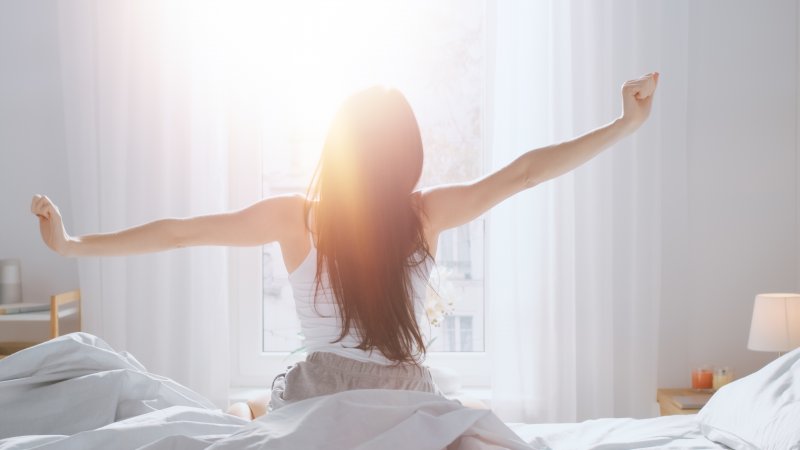
The habits you do (or don’t) implement throughout the day have a big impact on your sleep quality at night. You may never have considered how these collective “sleep hygiene” habits affect your sleep, but now’s the time to start. Good sleep is critically important for your health and overall quality of life.
If you find yourself consistently struggling to fall and stay asleep, examining your sleep hygiene and making a few tweaks might be exactly what the doctor ordered. While some of these adjustments are easier said than done, the positive benefits are well worth it. After all, who wouldn’t kill for an amazing night’s sleep on a regular basis? Implement these tips and a better night’s sleep is sure to follow.
1. Maintain a consistent schedule
The #1 tip for better sleep is to stick to a consistent sleep schedule – which means going to bed and waking up at the same time seven nights a week. Although it can be tempting to go to bed later and sleep in on the weekends, research shows that doing so is actually associated with worse mood, poorer health, and heart disease.
2. Cut out late-night meals
While you shouldn’t go to bed hungry, eating too much before bed sets you up for a night of restless sleep. If you have to eat, opt for foods that promote sleep, which include things like bananas, nuts, dairy products, and fruits.
3. Avoid alcohol right before bed
Consuming alcohol can be tempting since it often helps people fall asleep. However, drinking alcohol too close to bed actually decreases the amount of deep sleep your body gets, decreasing overall sleep quality.
4. Reduce clutter in the bedroom
Clutter has a tendency to cloud our minds, which in turn affects quality of sleep. Your room should promote relaxation, so try to minimize distractions that can make your mind anxious.
5. Exercise
Exercising helps you burn energy during the day to sufficiently prepare your body for sleep when night comes. But keep track of what time you exercise, since working out too close to bed can produce endorphins that can make it difficult to fall asleep.
6. No caffeine after 12 PM
Coffees, teas, sodas, and other beverages that contain caffeine can keep you alert for hours. Limit all caffeine intake to before 12 PM so it won’t impact your sleep.
7. Be engaged
Keep your energy levels up throughout the day. Be diligent in your job, attend social events, and participate in activities with your family. Staying engaged during daylight hours will tire you out so that when bedtime rolls around, you fall asleep easier.
8. Dim the lights one hour before bedtime
Darkness is a key aspect of creating a comfortable sleep environment. If you don’t have curtains that sufficiently block out light, opt for an eye mask.
9. Create a Dark Space
Darkness is a key aspect of creating a comfortable sleep environment. If you don’t have curtains that sufficiently block out light, opt for an eye mask.
10. Limit bedroom activities
Make sure to keep TV watching, listening to music, and even reading out of the bedroom. These activities can promote feelings of wakefulness that keep you alert. Reserve your bedroom for sleep and intimacy only.
11. Avoid electronics in the evening
Eliminate the use of electronics, including your phone, computer, and TV before bed. These devices emit blue light that can reduce your body’s production of melatonin. Start by eliminating all electronics 15 minutes before bed, then 30 minutes, then one hour before bed.
12. Don’t lie awake
If you find yourself anxious and unable to find the right mindset to sleep, get out of bed. If you’re unable to fall asleep within 10-20 minutes, move to another room and do something that relaxes you, like reading or meditation.
What to Do if Good Sleep Hygiene Isn’t Enough
If you’re already practicing most of these habits, or you’ve implemented them and still find yourself having a hard time sleeping, there might be a bigger problem at play, like sleep apnea. This is a fairly common disorder in which a person’s breathing is interrupted throughout the night, lowering sleep quality, and most patients don’t even know they have it. If good sleep hygiene isn’t working for you, it’s time to see a doctor for a sleep test.
For people in the Atlanta area, Dr. Jeff Rodgers is a sleep medicine practitioner with over 20 years of experience helping patients discover the root of their sleep problems and overcome them. He can provide custom-made oral appliances, which look similar to a retainer or mouthguard and are proven to treat both sleep apnea and chronic snoring. To learn more and schedule a free consultation, click here.
